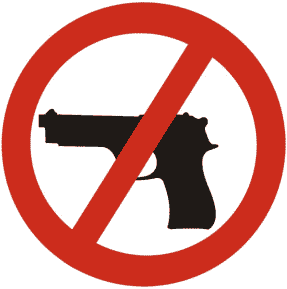Criminal Record and Gun Purchase Application Questions
People who try purchasing a gun from a dealer in Pennsylvania are required to complete an application that asks various questions about an applicant’s prior criminal history. People often think that if they are wrong on a question that it isn’t a big deal because the mistake will be caught by the background check and they will simply be prevented from buying a gun. A “no harm no foul” argument.
The applicants often have no idea that a mistake on a gun application answer can lead to criminal charges. One charge is a felony offense of Sale of Transfer of firearms under 18 Pa.C.S. 6111(g)(4)(ii) for “knowingly and intentionally” making a materially false written statement in connection with the purchase, delivery, or transfer of a firearm. Making a false statement includes completion of the gun application form. The applicant is also generally charged with a misdemeanor offense of Unsworn Falsification to Authorities under 18 Pa.C.S. 4904(a)(1) for making a false statement “which he does not believe to be true” with the “intent to mislead a public servant in performing his official function.” Basically, both charges allege that the person intentionally lied on the gun application in order to buy a gun.
of Unsworn Falsification to Authorities under 18 Pa.C.S. 4904(a)(1) for making a false statement “which he does not believe to be true” with the “intent to mislead a public servant in performing his official function.” Basically, both charges allege that the person intentionally lied on the gun application in order to buy a gun.
Common Mistakes on Gun Applications
The vast majority of mistakes on gun applications stem from questions that are related to Federal firearm prohibitions under 18 U.S.C. § 922(g) and involve:
- Misdemeanor conviction in state court punishable by more than two years
- Active PFA order that was issued after a hearing
- Misdemeanor crime of domestic violence
Defenses to Mistakes on Gun Applications
Many people believe that they can seek a dismissal of the charges because they did not know that they were prohibited from possessing a firearm and nobody ever told them. Gun ownership or the right to possess a gun is viewed as a collateral consequence and not a direct part of a sentence in a case, so the person is often not told directly that a conviction of a particular charge will invoke the Federal gun prohibition. Many people are not aware that Federal law prohibits them from possessing a gun.
Regrettably, ignorance of the law is not a defense and will not convince a prosecutor to dismiss the charges. Too many people have tried this approach without contacting an experienced defense attorney and have ended up in state prison. While ignorance is a not a defense, making a mistake is also not a criminal act. A primary defense in these cases is that the error on the application was a mistake and was not intentionally made to allow a person to violate the law and obtain a gun.
The charges require proof that the applicant “knowingly” or “intentionally” lied on the application. The questions on the application are confusing. The Federal prohibition for active PFA orders does not use the acronym “PFA” but instead uses the phrase “court order.” Many people do not understand that a PFA is a court order and thereby answer this question incorrectly. Another question asks if a prior conviction was punishable by more than one year. People often incorrectly answer this question because the offense occurred many years ago or because they focus on the actual sentence that was imposed while the question asks about the sentence that a judge could have imposed. People may recall the actual sentence that was imposed and have no idea about the maximum sentence that could have been imposed by the judge.
Trusting that the criminal justice system will “get it right” and realize that this was a mistake and dismiss the charges is naïve thinking, just ask the many people who are routinely prosecuted for these offenses. They are rarely outright dismissed. Depending upon the facts and circumstances of the case, these cases can be won with the assistance of an experienced defense lawyer. I defended a client in a gun application case at a trial in Centre County and obtained a not guilty verdict. Read more about it here.
